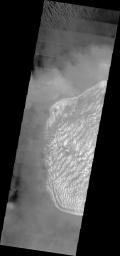
|
Charlier Crater Dunes
- Click the image above for a larger view
- Full-Res JPEG (1604 x 3409) (496.1 kB)
- Full-Res TIFF (1604 x 3409) (3.3 MB)
Caption:
Released 11 August 2003
A crater named after a Swedish astronomer hosts a dune field that is brightened by a layer of frost. Although the crater is located at high southern latitudes, it is probably too late in the spring season for the dunes to retain the CO 2 frost that forms during the southern winter; water ice is a better candidate for the dune frost.
Image information: VIS instrument. Latitude -68.1°, Longitude 190.4° East (169.6%deg; West). 19 meter/pixel resolution.
Note: this THEMIS visual image has not been radiometrically nor geometrically calibrated for this preliminary release. An empirical correction has been performed to remove instrumental effects. A linear shift has been applied in the cross-track and down-track direction to approximate spacecraft and planetary motion. Fully calibrated and geometrically projected images will be released through the Planetary Data System in accordance with Project policies at a later time.
Background Info:
NASA's Jet Propulsion Laboratory manages the 2001 Mars Odyssey mission for NASA's Office of Space Science, Washington, D.C. The Thermal Emission Imaging System (THEMIS) was developed by Arizona State University, Tempe, in collaboration with Raytheon Santa Barbara Remote Sensing. The THEMIS investigation is led by Dr. Philip Christensen at Arizona State University. Lockheed Martin Astronautics, Denver, is the prime contractor for the Odyssey project, and developed and built the orbiter. Mission operations are conducted jointly from Lockheed Martin and from JPL, a division of the California Institute of Technology in Pasadena.
Cataloging Keywords:
| Name | Value | Additional Values |
|---|---|---|
| Target | Mars | |
| System | ||
| Target Type | Planet | |
| Mission | 2001 Mars Odyssey | |
| Instrument Host | Mars Odyssey | |
| Host Type | Orbiter | |
| Instrument | Thermal Emission Imaging System (THEMIS) | |
| Detector | ||
| Extra Keywords | Crater, Dune, Grayscale, Thermal, Water | |
| Acquisition Date | ||
| Release Date | 2003-08-28 | |
| Date in Caption | 2003-08-11 | |
| Image Credit | NASA/JPL/ASU | |
| Source | photojournal.jpl.nasa.gov/catalog/PIA04706 | |
| Identifier | PIA04706 | |
